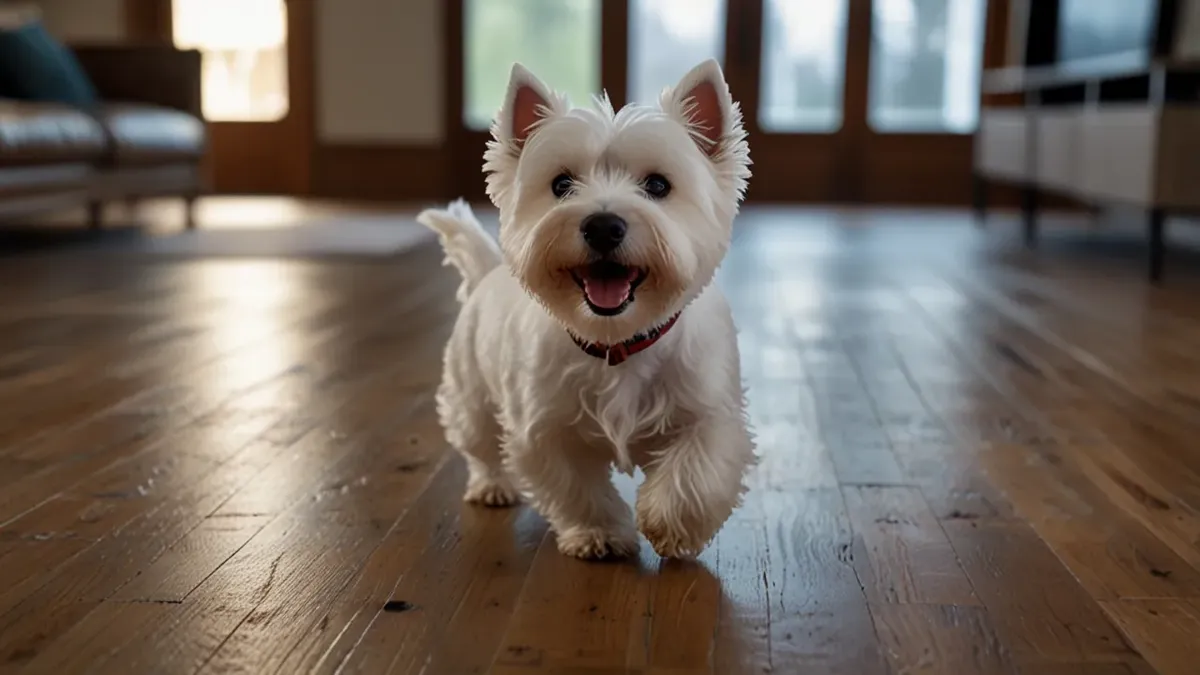In this Guide:
Published: January 13, 2025
Last Updated: March 14, 2025
Key Stages of Life
Puppyhood (0-6 months):
During this stage, West Highland White Terrier puppies are curious and full of energy. They are learning about their environment and developing social skills. This is a time when they may be prone to chewing and exploring, so consistent training and patience are necessary to guide them through their early stages.
Adolescence (6 months - 2 years):
As adolescents, West Highland White Terriers may test boundaries and seek independence. Despite their small size, they still require plenty of exercise and mental engagement to prevent boredom and potential destructive behaviours. They may display some stubbornness as they mature, so training will require patience and consistency.
Adulthood (2 - 7 years):
In adulthood, West Highland White Terriers are energetic, loyal, and affectionate. They typically reach their peak physical and mental abilities during this time and enjoy activities such as walking, playing fetch, and engaging in problem-solving games. Their small size does not diminish their need for regular activity and stimulation.
Senior years (7+ years):
As West Highland White Terriers enter their senior years, they may start to slow down and show signs of ageing, such as reduced energy levels and joint stiffness. Regular veterinary checkups, proper nutrition, and age-appropriate exercise are key to ensuring they maintain a good quality of life in their later years.
Note:
While variations in coat texture or colour do not significantly affect the lifespan of West Highland White Terriers, responsible breeding, proper nutrition, regular exercise, and healthcare are crucial factors in maintaining overall health and longevity.

Exercise needs and activities

West Highland White Terriers are energetic and spirited dogs that thrive on regular physical activity and mental stimulation. While they may be small in size, their exercise requirements are essential to keeping them happy and healthy.
Here are some activities particularly well-suited to meet the exercise needs of West Highland White Terriers:
Daily walks: West Highland White Terriers love exploring their surroundings. Daily walks, ideally for 30–45 minutes, provide the physical activity they need while offering opportunities to satisfy their natural curiosity and sniffing instincts. Shorter walks can be taken multiple times a day for older or less active Westies.
Interactive play: games like fetch, tug-of-war, or chasing a ball cater to a West Highland White Terrier’s playful nature. These activities help burn off energy while strengthening the bond between dog and owner. Interactive toys and puzzles can also engage their sharp minds.
Obedience training: incorporating obedience training into their exercise routine is a great way to challenge their intelligence while reinforcing good behaviour. Short, fun training sessions can double as mental and physical exercise.
Exploration and scent games: as natural hunters, West Highland White Terriers enjoy activities that let them use their excellent sense of smell. Create scent trails or hide treats around the garden or house to keep them entertained and stimulated.
Short hikes or outdoor adventures: while West Highland White Terriers may not have the endurance of larger breeds, they enjoy short hikes or outdoor activities where they can explore varied terrain. Always ensure they’re on a leash in open areas to prevent them from chasing wildlife.
Agility exercises: though not as common for smaller breeds, many West Highland White Terriers excel in agility training. Activities like navigating small tunnels, jumping over low hurdles, or weaving through poles are both mentally and physically engaging.
Signs your West Highland White Terrier isn't getting enough exercise:
- Restlessness or pacing
- Destructive behaviour
- Hyperactivity
- Attention-seeking behaviour
- Reduced obedience or focus
- Excessive barking
If you notice these signs, evaluate your Westie’s exercise routine and adjust the intensity or duration. As active dogs, West Highland White Terriers need constant stimulation to stay balanced.
Socialisation needs
Socialisation is crucial for West Highland White Terriers to ensure they grow up to be well-adjusted, friendly dogs. Here are some key aspects of socialisation for your Westie:
- Early exposure: begin socialising your West Highland White Terrier as early as possible, ideally from puppyhood. Expose them to a variety of people, animals, sounds, and environments to help them become well-rounded and confident.
- Puppy classes: enrol your West Highland White Terrier in puppy socialisation classes or obedience training, where they can interact with other puppies and learn proper social behaviours in a structured environment.
- Regular social interactions: make an effort to expose your West Highland White Terrier to different people and situations regularly to build confidence and social skills.
- Supervision: always supervise your West Highland White Terrier during socialisation experiences to ensure they are comfortable and safe. Monitor their reactions to new stimuli to assess their comfort level.
- Positive reinforcement training: use praise, treats, and rewards to reinforce good behaviour during socialisation and training sessions.
By providing early and consistent socialisation, you can help ensure that your West Highland White Terrier grows up to be friendly, confident, and well-behaved.
Grooming needs
Westies have a distinctive white, wiry coat that requires regular grooming to maintain its health and appearance.
Here are some grooming tips for your West Highland White Terrier:
- Brushing: the wiry coat of a Westie needs brushing at least twice a week to prevent matting and tangling. A pin brush or comb works well to manage the coat and keep it free of knots.
- Bathing: West Highland White Terriers don't require frequent baths, but a bath every few weeks can help maintain their cleanliness. Use a mild dog shampoo, and ensure you rinse thoroughly to avoid irritation.
- Ear care: West Highland White Terriers are prone to ear infections due to their floppy ears. Check their ears regularly for signs of wax buildup or redness, and clean them with a dog-safe ear cleaner as needed.
- Nail trimming: trim your West Highland White Terrier’s nails regularly to avoid discomfort and ensure they don’t get too long, affecting walking.
- Dental care: brush your West Highland White Terrier’s teeth regularly to prevent plaque buildup and dental issues. Providing dental chews can also help.
- Anal gland expression: some West Highland White Terriers may need occasional anal gland expression. If you notice signs of discomfort or scooting, consult your vet.
By following these grooming routines, you’ll keep your West Highland White Terrier looking sharp and maintain their health.
Training: mental stimulation is key
West Highland White Terriers are intelligent, independent, and energetic dogs. Consistent, positive reinforcement training is essential to keep them well-behaved.
Here are some training tips for your Westie:
- Start early: begin training your West Highland White Terrier as soon as possible, ideally during puppyhood. Early training sets the foundation for a well-behaved dog later on.
- Positive reinforcement: West Highland White Terriers respond well to rewards like treats and praise. Reinforce desired behaviour with these rewards to encourage good habits.
- Consistency: consistent commands and expectations are crucial. Ensure everyone in your household uses the same commands to avoid confusion.
- Short sessions: West Highland White Terriers are smart but can have short attention spans. Keep training sessions brief but engaging to maintain focus.
- Variety: keep training exciting by introducing new commands and challenges. This mental stimulation helps prevent boredom and encourages problem-solving.
- Patience: West Highland White Terriers can be a bit stubborn, so training may take time. Remain patient and avoid punitive methods that could damage the trust between you and your dog.
Shedding and hypoallergenic considerations
West Highland White Terriers have a moderate shedding level due to their wiry coat, but they are considered to be hypoallergenic. They do shed, but not excessively, and their coat requires regular grooming to manage loose hairs. Regular brushing helps reduce shedding around the house.
Energy level and living situations
Westies are active and thrive in homes where they have opportunities for regular physical and mental stimulation. They are best suited for:
- Active owners: West Highland White Terriers need owners who can provide regular exercise and mental stimulation. Families or individuals who enjoy outdoor activities will find the Westie a perfect companion.
- Spacious environments: though their size is small, Westies do best in homes with secure outdoor areas where they can play and explore.
- Mental challenges: West Highland White Terriers are intelligent and enjoy engaging with interactive toys, puzzle games, and tasks that challenge their minds.
West Highland White Terriers: Eager to please
West Highland White Terriers are adored for their lively personality and endearing temperament:
- Friendly and affectionate: West Highland White Terriers are known for their cheerful and outgoing nature. They form strong bonds with their families and enjoy being the centre of attention. Their affectionate disposition makes them wonderful companions for households of all sizes.
- Intelligent and trainable: West Highland White Terriers are clever little dogs with a streak of independence. With consistent, positive reinforcement, they respond well to training. Their intelligence and willingness to learn make them capable of mastering obedience, tricks, and even agility exercises.
- Natural instincts: as terriers, West Highland White Terriers have a strong prey drive and a natural inclination for digging and chasing small animals. While these instincts make them energetic and lively, early socialisation and training can help ensure they get along well with children and other pets.
- Need for stimulation: West Highland White Terriers are spirited dogs that thrive on activity and engagement. Without enough mental and physical stimulation, they may become bored or exhibit stubborn behaviours. Regular play, training, and exercise are key to keeping them content and well-behaved.
- Ideal family pets: West Highland White Terriers make excellent companions for individuals and families who can match their energy and zest for life. Their playful, loyal, and loving nature ensures they are a delightful addition to any home.
Health considerations and common conditions
Common health issues that West Highland White Terriers may be prone to include:
- Hip dysplasia: a condition where the hip joint doesn’t develop correctly, leading to arthritis.
- Patellar luxation: a knee condition that causes the kneecap to slip out of place.
- Allergies: West Highland White Terriers can be prone to skin allergies or gastrointestinal sensitivities.
- Liver disease: West Highland White Terriers may be more susceptible to liver conditions, particularly in their senior years.
Regular veterinary visits, a healthy diet, and consistent exercise are important to help manage and prevent these issues. With proper care, Westies can live long, healthy lives and make loyal companions.
Costs of owning a West Highland White Terrier

In Britain, the costs of owning a West Highland White Terrier can vary depending on location, the quality of products or services, and the individual dog's needs.
Below is an overview of potential expenses:
- Food: high-quality dog food tailored to a West Highland White Terrier’s size, age, and activity level typically costs around £30 to £60 per month, depending on the brand and ingredients.
- Veterinary care: routine veterinary costs, including vaccinations, annual check-ups, flea and worm treatments, and any routine medications, can range from approximately £200 to £500 per year.
- Grooming: West Highland White Terriers have a double coat that requires regular grooming. Professional grooming appointments, along with brushes, shampoos, and other tools, may cost £100 to £300 or more annually.
- Toys and accessories: items like toys, bedding, collars, and leads for your Westie can cost around £50 to £150 per year, depending on preferences and replacement needs.
Overall, the annual cost of owning a West Highland White Terrier in Britain may range between £1,000 and £2,000, or even more depending on lifestyle factors and unforeseen expenses. It’s vital to budget for both routine care and unexpected costs that could arise over your Westie’s lifetime. Getting dog insurance for your Westie will be one of the best ways to keep costs down over its lifetime.
West Highland White Terriers: the dog for loyal and loving owners
West Highland White Terriers, affectionately known as Westies, are wonderful companions for individuals or families looking for an intelligent, spirited, and loving dog. However, their unique needs and characteristics should be carefully considered before bringing one into your home.
By ensuring they receive regular grooming, adequate exercise, mental stimulation, and proper healthcare, you can build a lasting bond with your Westie and enjoy their playful and affectionate nature for many years. With a lifespan of 12 to 16 years, Westies require long-term dedication and commitment to their well-being.
If you’re ready to provide the love, attention, and care they deserve, a West Highland White Terrier can make a delightful and loyal addition to your family.
To help safeguard your Westie against potential health issues, explore our range of pet insurance packages designed to keep your furry friend happy and healthy.
Was this article helpful?



